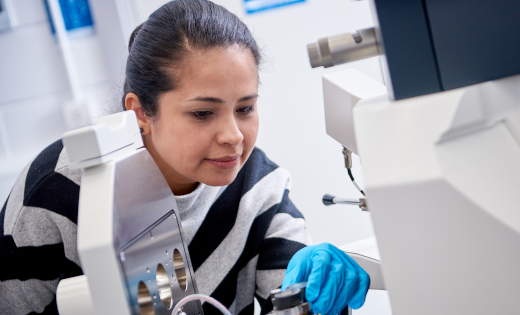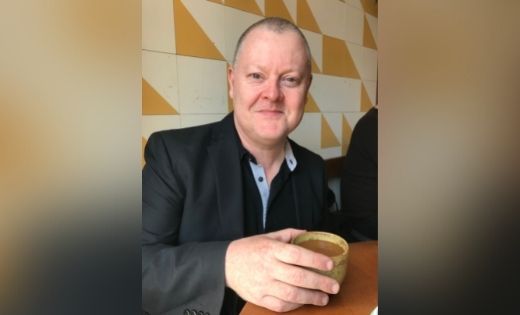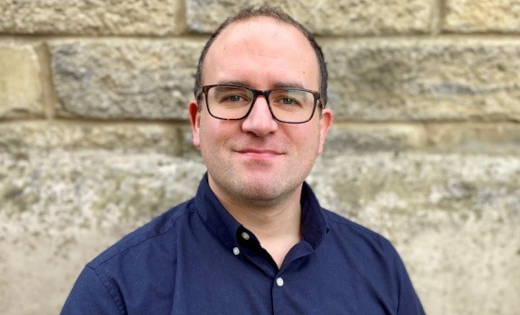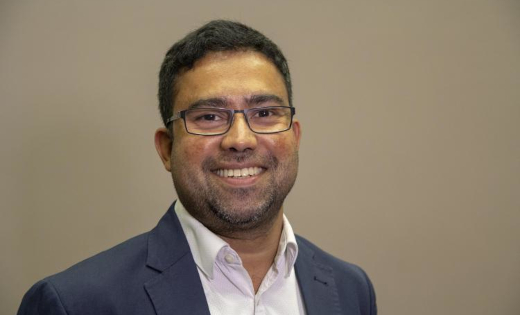Celebrate Our Staff – March 2022
Join us as we celebrate our colleagues’ achievements across the University from the past few weeks.
Adele Parry won the prize after addressing MPs and members of the House of Lords

Featured this month:
- Top award for physicist
- Recognition for construction material research
- Honorary Doctorate for Postcolonial Literature pioneer
- Research to investigate the origins of Earth
- Continuing engagement with the United Nations
- Priestley researcher joins European board of climate experts
- Celebrating Fellowship success
Top award for physicist
PhD researcher Adele Parry has won the STEM for Britain prize, organised by MPs and members of the House of Lords.
She’s investigating the way liquid crystals could be used in low-cost and portable medical devices to detect for infections caused by bacteria and viruses.
Liquid crystals are more commonly found in television, computer and smartphone displays.
Adele said: “I saw STEM for Britain as a fantastic opportunity to explain my research to a completely different audience than I would usually present to. I wanted to show how exciting this area of research is.
“The day was nerve-racking but also exciting. I got to speak to parliamentarians and met lots of other young researchers.”
She received a £1,500 prize, Gold Medal in the physics section of the competition and was awarded the overall Westminster Wharton Medal.
Held in the House of Commons, the Parliamentary and Scientific Committee runs the event in collaboration with the Institute of Physics and other learned societies, including the Royal Academy of Engineering, Royal Society of Biology, Royal Society of Chemistry, Physiological Society, Council for the Mathematical Sciences and the Nutrition Society.
The event highlights the best of UK scientific research conducted by early career researchers and is in the only national competition of its kind.
Helen Gleeson, Cavendish Professor of Physics at Leeds and Adele’s supervisor, said: “This a fantastic achievement. Adele is a great communicator and a talented researcher – this award is really well-deserved.”
Construction material research recognition

Professor Susan Bernal Lopez has been awarded the 2022 Robert L’Hermite medal by the International Union of Laboratories and Experts in Construction Materials, Systems and Structures (RILEM).
The award recognises the outstanding impact of her research activities on assessment and improvement of durability, and sustainability of, novel cements and concretes, as well as waste management.
She said: “‘I’m very honoured to receive the 2022 Robert L’Hermite award.
“This award is particularly important to me, as I’ve been a member of the RILEM from a very early stage of my career, and previous medallists are making amazing contributions in their different areas of research. It’s a true privilege to count myself among them now.
“I would like to acknowledge that this is a recognition of a team effort. I’m most grateful with all colleagues, family and friends that have supported me throughout the years.
“I’m also immensely grateful to the RILEM for the many opportunities that it has given me, and for inspiring and enabling academics, researchers and industry to work together to resolve some of the major challenges in my research field.”
This prestigious medal has been awarded each year since 1967 to a researcher under the age of 40 who has made an exceptional scientific contribution to the field of construction materials and structures.
The award ceremony will take place during the 76th RILEM Annual Week and The International Conference on Regeneration and Conservation of Structures (ICRCS 2022) in Kyoto, Japan.
Honorary Doctorate for postcolonial literature pioneer

Professor John McLeod is to be honoured by an institution in Finland
John McLeod, Professor of Postcolonial and Diaspora Literatures in the School of English, will receive an honorary Doctorate from the University of Turku, Finland.
Their Faculty of Humanities highlighted his ‘remarkable’ international career as a ‘pioneer’ in postcolonial studies, as well as his various collaborations with Finnish researchers during the past 15 years.
On the announcement, Professor McLeod said: “It’s an enormous honour to be recognised by the University of Turku in this way.
“I’ve learned such a great deal over the years through my collaboration with overseas partners, and this award will inspire me to continue to work creatively with the international postcolonial research community.”
Professor McLeod is also a visiting professor at the University of Paris-Sorbonne and is active in the training of researchers interested in postcolonial themes.
His first book, ‘Beginning Postcolonialism’, became an established international bestseller in the field and is used as a vital resource for those taking undergraduate courses in postcolonial studies.
His research interests include transcultural adoption, postwar London writing, and cross-border migration and mobility.
His is one of 15 honorary doctorates that will be conferred during a ceremony in May.
Find out more
Investigating the origins of Earth
 The Fellowship will enable Dr John Ilee to study discs that swirl around newly formed stars to help establish how planets are formed
The Fellowship will enable Dr John Ilee to study discs that swirl around newly formed stars to help establish how planets are formed
Dr John Ilee has been awarded a five-year fellowship to answer one of the most fundamental questions in science – how do planets form?
He has been awarded an Ernest Rutherford Fellowship, named after the physicist whose ground-breaking research explained the structure of atoms and radioactivity.
The Fellowship is awarded by the Science and Technology Facilities Council (STFC).
Dr Ilee said: “I was absolutely delighted and honoured to find out I would be an Ernest Rutherford Fellow.
“It’s a very exciting time for research into planet formation at the moment, and I’m really pleased that I will be able to contribute to what I’m sure will be fascinating discoveries using the latest ground and spaced-based observatories.”
He will use theoretical models and observations from deep in space to try and understand the processes that happen in the protoplanetary discs that swirl around a newly forming star – to help determine if there are other solar systems like ours.
The discs, which are made of dense gas, dust and ice, provide the chemical building blocks from which planets form.
Dr Ilee said: “Studying these discs gives us unique insights into the raw material that goes on to form planets and can answer fundamental questions about our place in the Universe. Is our Solar System rare? What types of planets are commonly formed? Where and how do planets inherit their composition?”
Continuing engagement with the United Nations
 Professor Peter Whelan has continued with work with the UN
Professor Peter Whelan has continued with work with the UN
Professor Peter Whelan attended and spoke at the recent meeting of the United Nations Research Partnership Platform (UN RPP) on Competition and Consumer Protection.
Hosted by the United Nations Conference on Trade and Development (UNCTAD), the RPP provides a platform for researchers to undertake joint activities with the UN, allowing researchers to input their expertise into policy-driven debates to achieve real-world-impact.
The Centre for Business Law and Practice (CBLP), which is based in the School of Law, is a formal member of the RPP.
At the RPP’s first meeting of the year, Professor Whelan emphasised the centre’s continuing commitment, and outlined specifically how relevant CBLP members will contribute to it in the future.
He said: “The RPP is an excellent initiative, and one to which the competition law experts in the CBLP are unequivocally dedicated.
“Over the coming years, we aim to contribute to the RPP in order to provide policy advice on the formulation and enforcement of competition laws and policies, support educational activities on competition, and contribute to training and capacity building in the developing world. We will, of course, input our own competition law research, where relevant.
“It’s a real privilege for us to be able to engage with the United Nations in this manner.”
This contribution continues Professor Whelan’s high-level engagement with the UN.
In February 2021, Professor Whelan was formally invited to become a member of the UN’s working group on Cross-Border Cartels, where he’s the only UK academic participant.
In February this year, he was also invited to become a member of the UN’s working group on Modalities of Peer Review.
Priestley researcher joins European climate experts
 Professor Suraje Dessai will be helping to advise the European Union on climate change
Professor Suraje Dessai will be helping to advise the European Union on climate change
Professor Suraje Dessai has been appointed to the new European Scientific Advisory Board on Climate Change.
He joins a panel of 15 independent senior scientific experts covering a broad range of disciplines.
The advisory board will provide the European Union with scientific knowledge, expertise and advice relating to climate change. Their work will underpin the EU’s efforts to become carbon neutral by 2050, as well as broader action on tackling the climate crisis.
Professor Dessai said: “It’s an absolute honour to join the European Scientific Advisory Board on Climate Change. Scientific advice is critical to inform climate action in the EU.
“I’m looking forward to helping the EU accelerate climate adaptation action to create a climate-resilient Europe.”
Professor Dessai’s interdisciplinary research focuses on the links between climate science and decision science.
His work, for example, explores perceptions of climate risks and decision making when the likelihood of different future scenarios are unknown. He also looks at the links between science and policy when exploring climate change impacts, adaptation and services.
In 2021, Professor Dessai was ranked 120 in the Reuters list of the world’s top climate scientists. He has advised the United Kingdom and Portuguese governments, as well as the Organisation for Economic Co-operation and Development (OECD).
Celebrating Fellowship success
 Several new Advance HE Fellowships have been announced
Several new Advance HE Fellowships have been announced
New Advance HE (HEA) Fellowships have been announced through our Professional Recognition in Student Education (PRiSE) scheme.
Run by Organisational Development and Professional Learning (OD&PL), the scheme aims to support colleagues to gain HEA Fellowship and earn professional recognition for their contribution to student education.
One of the most recent Senior Fellows is Charlotte Haigh, Director of Student Education and Associate Professor of Human Physiology in the School of Biomedical Sciences.
She said: “Taking the time to reflect on the impact of your learning and teaching on students is important as an educator.
“Highlighting how pedagogy has influenced your practice, at the same time as how you have influenced others, really is time well spent.
“The encouragement of staff involved in the PRiSE scheme is invaluable, and at the end of the process you have a fellowship that’s recognised across the HE sector.”
PRiSE applications are reviewed four times a year. So far in 2022, after two panels, Leeds has 26 new Associate Fellows, 27 new Fellows and four new Senior Fellows.
Allie Mills, PRiSE Scheme Leader, said: “One of the best parts of PRiSE is working with, and supporting, our colleagues to develop their student education practices.
“We congratulate all of the Fellows we’ve had the pleasure of working with. To be able to work with committed student education practitioners from across the University is to work with the most innovative, engaged and aware individuals – all coming together as a community of PRiSE AHE Fellows.”
At the time of writing, Leeds has 1,174 Fellows – 196 Associate Fellows, 883 Fellows, 91 Senior Fellows and four Principal Fellows. Many of these contributed to Advance HE celebrating the milestone of surpassing 150,000 Fellowships in October 2021.
Get in touch!
We know there are lots of great things happening to support the work of the University – and we want to hear about them!
Please follow the staff Twitter account to see the latest updates and copy in our @UniLeedsStaff handle when posting success stories, so we can share them with colleagues.
You can also contact Internal Communications and Engagement directly if you or one of your colleagues would like to appear in this monthly feature. This is open to all staff – professional and academic.